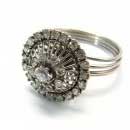It’s the finale…the last installment of popular questions. I hope they’ve been helpful. And if you have any questions for me, feel free to ask. I’d love to hear from you! So here we go:
1. I’m getting married next year. Should my fiancé and I keep separate accounts or have one joint account?
It’s fine to have a joint account for bill paying, etc, but be sure you have one for yourself too. Every woman needs an account in her own name.
2. How can I stop being such a compulsive shopper?
As my mentor, Karen McCall, a pioneer in financial recovery, always said: “You can never get enough of what you don’t really need.” The problem isn’t the shopping, but the “hole in your soul” you’re trying to fill. I highly recommend attending DA (Debtors Anonymous) meetings, a 12 step program for over-spenders, chronic debtors, and underearners.
3. What is one of the most common money mistakes women make and how can I avoid it?
Without a doubt; it’s doing nothing because you’re afraid of making a mistake. My advice is to spend 3-6 months educating yourself. How?
- Every day read something about money, even if it’s just the headlines in the business section of the newspaper, even if it’s only for 1or 2 minutes.
- Every week, talk about money, particularly with someone who knows more than you. (taking a class counts too).
- Every month, save by having a small amount from your paycheck or checking account automatically deposited in a savings and/or retirement account.
I also encourage women to find a financial advisor they can trust, who will hold them accountable and keep them on track.
4. I’m always worrying about money. How can I calm my fears?
- Educate yourself. Knowledge is the best anecdote for fear. The goal is to make financial decisions from knowledge, not ignorance, emotion or habit. Doing the 3 steps I outlined above is an amazingly simple but effective way to conquer money fears.
- Join with others. We women are so relationship oriented, one of the best ways to learn is to get support by forming (or joining) a money book club, money study group, or investment club.
- Track your spending. Write down every penny you spend for at least a month, then transfer those amounts to spending categories. This exercise allows you to see how/where you can shave expenses, figure out a debt repayment plan, and increase savings.
- Create an emergency savings fund with at least 6 months worth of living expenses (a shoe sale is NOT an emergency!)
5. As a young career woman, what’s the single smartest thing I can do with my money now?
Automatic savings. Arrange to have the bank, every month, withdraw money from your checking account or paycheck and deposit it monthly into a personal savings account. Even small amounts ($10 or $20 a month) consistently saved accumulate quickly. It’s money you’d otherwise fritter away. And you don’t miss what you don’t see!! Do the same with your company’s retirement account.
6. My current salary is under 50K. How can I make more money?
If you love what you do, ask for a raise. If you get a ‘no’, ask your boss what you need to do for a pay increase. If you feel dead-ended, or dislike your current job, start looking for a better, higher paying one. Figure out what you’re passionate about and network like crazy. From my interviews with six- and seven-figure women, I discovered that four factors are essential for financial success and quality of life (both are important):
- Passion—loving what you do
- Audacity—doing what you fear
- Resilience—getting back up when you fall down
- Community—reaching out for support








 Here’s a question for you. If you had a choice—a $25,000 diamond ring or $25,000 in stock—what would you pick?
Here’s a question for you. If you had a choice—a $25,000 diamond ring or $25,000 in stock—what would you pick?